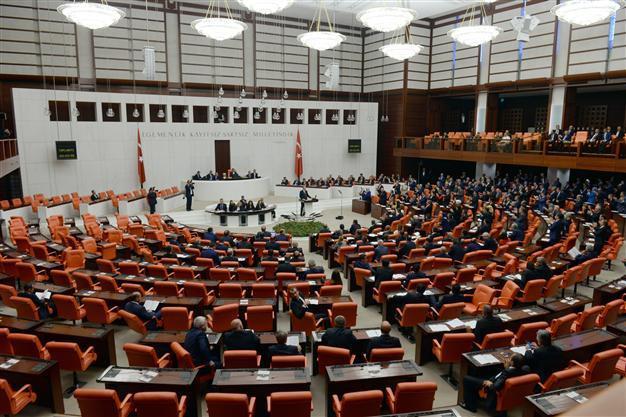Turkey’s opposition seeks parliamentary probe into Ankara attacks
ANKARA

AA Photo
Turkey’s opposition parties have mobilized to have the country’s national assembly involved in the investigation of the Oct. 10 Ankara double suicide bombing which killed at least 97 people, while they have particularly underlined the failure of the current caretaker of the interim government, the Justice and Development Party (AKP), to thoroughly investigate the bomb attacks which took place in southeastern Diyarbakır and Suruç earlier this year.Dubbing the Oct. 10 attack as one of “the bloodiest massacres in the country’s history,” a group of lawmakers from the main opposition Republican People’s Party (CHP) filed a motion to parliament on Oct. 14, appealing for the opening of a parliamentary inquiry into the suicide bombing.
The Peoples’ Democratic Party (HDP) also tabled a motion, with questions addressed to Prime Minister Ahmet Davutoğlu and arguing that the government, the National Intelligence Organization (MİT) and those who at the time refused the establishment of an “investigation commission for terror incidents,” were actually responsible for the attack that rocked the capital city of Ankara.
“The biggest reason for the disaster that is being experienced today is the fact that the explosions that took place both in Diyarbakır and Suruç had various similarities with the explosions at the Ankara Railway Station and no lesson has been drawn from these incidents,” the CHP said in its motion, asking for “far-reaching handling of the explosions in Diyarbakır, Suruç and Ankara in connection with each other.”
Four people were killed in the bombing of a HDP rally in Diyarbakır on the eve of the June elections. In July, a suicide bombing blamed on the Islamic State of Iraq and the Levant (ISIL) in Suruç near the Syrian border killed 33 mostly young pro-Kurdish activists. Details of the investigations into the Diyarbakır and Suruç bombings have never been made public and are subject to reporting restrictions under Turkish law.
The Kurdish-problem focused HDP, which says it was the target of the Ankara bombings and that President Recep Tayyip Erdoğan and the government have blood on their hands, once more blamed both the government and security officials for their failure to provide security for the attendees of the peace rally on Oct. 10, where the party’s grassroots had a major presence.
“Although there were significant signs that a suicide bomb attack would take place particularly before the elections [the snap elections on Nov. 1] exactly like it happened in the Suruç and Diyarbakır massacres, findings about the source of this action have been turned a blind eye to by intelligence units and measures have been taken by governmental officials only concerning [the findings on] high-level officials,” HDP Deputy Parliamentary Group Chair Pervin Buldan said in her motion filed on Oct. 14.
Security warnings had been sent to embassies days before the rally, which was known to be crowded, but the authorities “declined to share” the same security warnings with the organization committee of the rally, Buldan said.
“Besides this neglect, as a result of the absence of security measures on roads leading to the rally, which is a routine practice in all other demonstrations, this outcome was knowingly and willingly created. The government that you [AKP] lead and which has supported and fed extremist and Islamist organizations in the region, in the name of the goal of toppling [Syrian President Bashar al-]Assad, with its own hands and which led to the bomb explosion as a result of a national security vacuum and intelligence failure at a rally where hundreds of thousands would attend, the MİT, which needed to stop terror attacks via intelligence gathered beforehand, and those who refused the establishment of an ‘investigation commission for terror incidents’ are primarily responsible for this massacre,” she said.
The AKP government launched military operations after the suicide bombing in the town of Suruç, which was blamed on ISIL - an arch-foe of the outlawed Kurdistan Workers’ Party (PKK) and its U.S.-backed Syrian affiliate.
Within days after the attack that killed dozens of civilians, the CHP filed a motion for the establishment of an inquiry commission into terrorist activity. Yet the motion was rejected by votes from the AKP and the Nationalist Movement Party (MHP).
















